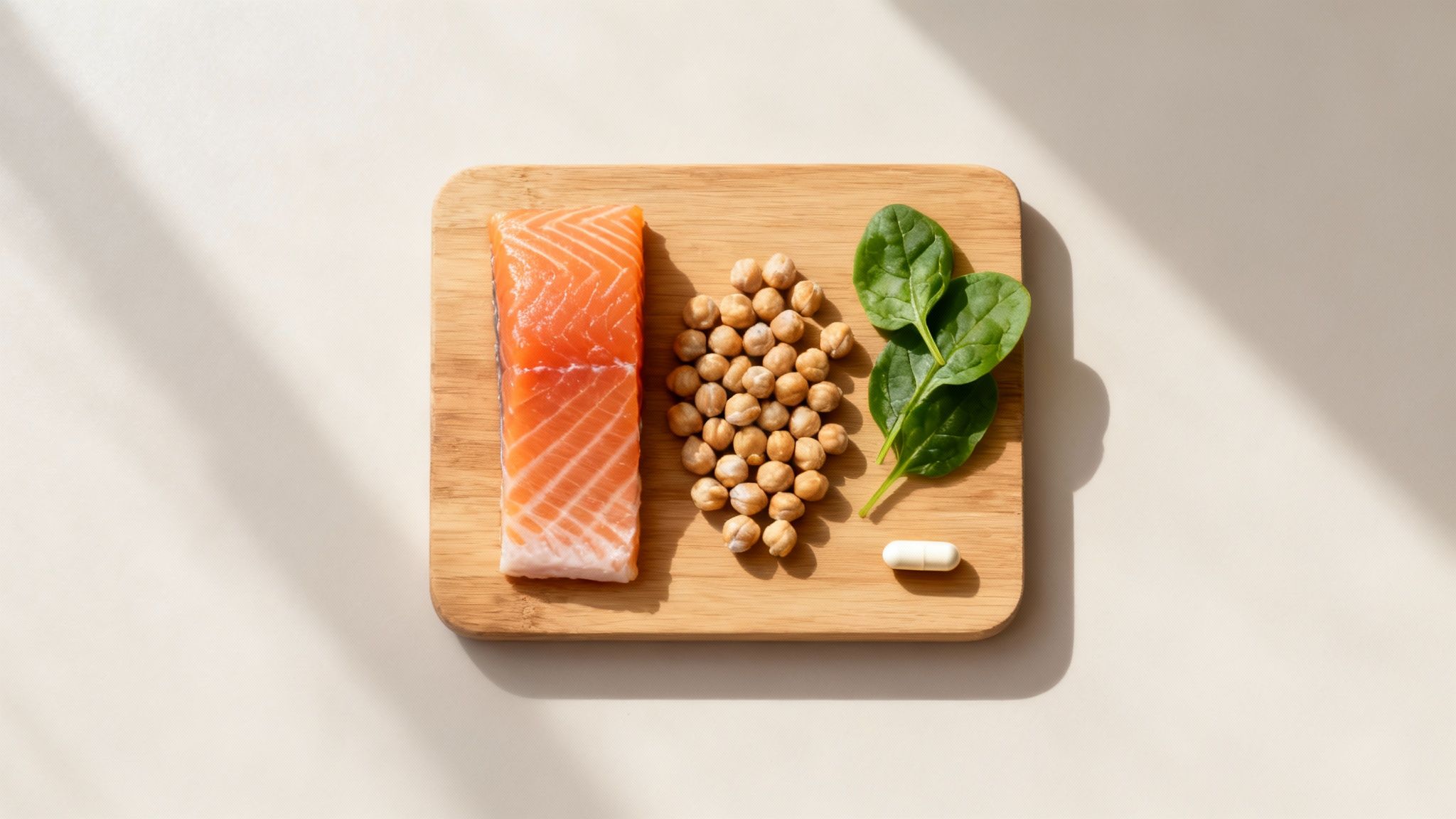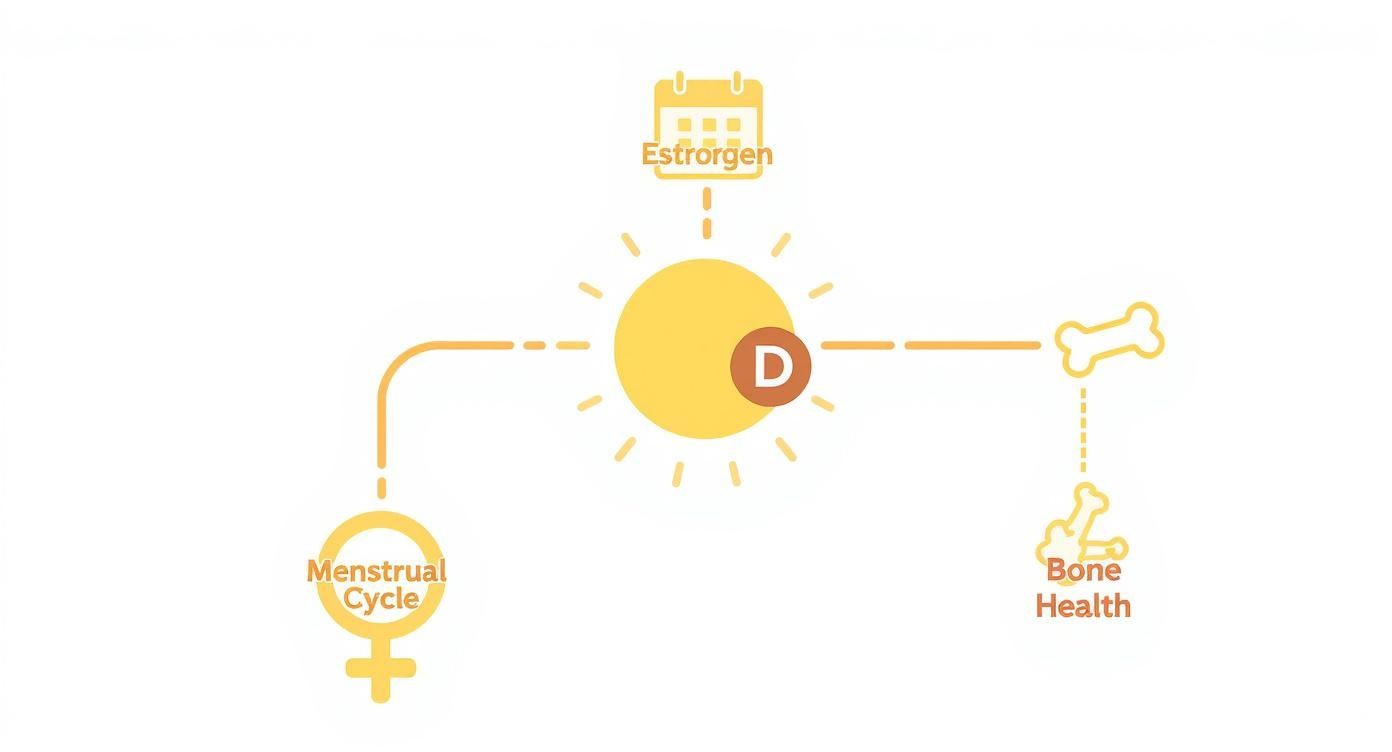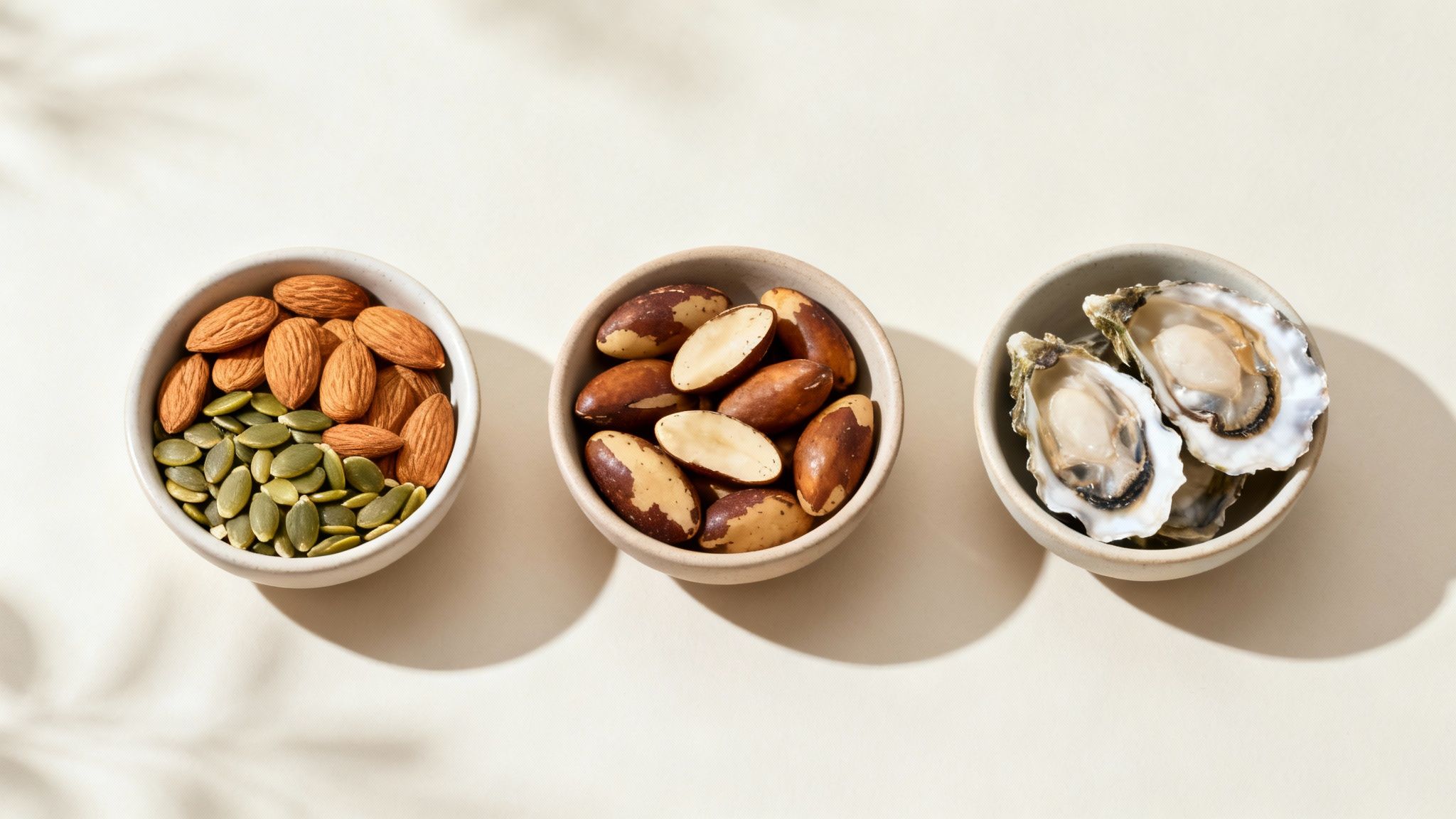
Vitamins for Female Hormone Balance
Share
A well-rounded diet, packed with specific nutrients, is the cornerstone of hormonal harmony. Certain vitamins are real power players here – think of the B-complex family (especially B6), Vitamin D, and fat-soluble heroes like Vitamin E. They act as the essential building blocks and regulators for your body's incredibly complex endocrine system.
Understanding Your Hormonal Symphony

Picture your hormones as a beautifully tuned orchestra. When key players like estrogen, progesterone, and testosterone are all playing in sync, you feel fantastic – energetic, sharp, and emotionally steady. But if just one instrument is out of tune, whether it's playing too loud or too soft, the whole performance can start to sound off.
This delicate interplay is exactly what we mean by 'hormone balance'. It’s not a single condition but a whole spectrum of experiences that can dictate how you feel from one day to the next.
What Is a Hormonal Imbalance?
At its simplest, a hormonal imbalance means you have too much or too little of a particular hormone. For women, this often comes down to the ebb and flow of estrogen and progesterone, the two hormones that conduct the menstrual cycle. Even tiny shifts in their levels can create a noticeable ripple effect throughout your entire body.
These fluctuations can trigger a whole host of frustrating symptoms that many of us are told are just a "normal" part of being a woman. Sound familiar?
- Irregular, painful, or heavy periods
- That feeling of being constantly tired, no matter how much you sleep
- Mood swings, irritability, or a sense of anxiety that comes out of nowhere
- Trouble falling or staying asleep
- Unexplained weight changes or persistent bloating
These aren't just random issues to be ignored. They're signals from your body telling you that something in the system needs a bit of support. More often than not, they are all connected, pointing back to an underlying disruption in your hormonal rhythm.
The Role of Vitamins as Conductors
This is where your diet, and certain vitamins in particular, can make a world of difference. If your hormones are the musicians, think of vitamins as the conductors of the orchestra. They don’t write the music, but they give the essential cues and support needed to ensure every instrument plays its part perfectly and on time.
Vitamins act as cofactors, which is a fancy way of saying they help kick-start the biochemical reactions needed for hormone production, metabolism, and detoxification. Without enough of these micronutrients, your body just doesn't have the right tools to keep everything in equilibrium.
Take the B vitamins, for instance. They are absolutely crucial for helping your liver process and clear out old estrogen, preventing a traffic jam of hormones. Vitamin D, on the other hand, acts more like a hormone itself, directly influencing everything from your reproductive health to your mood.
Throughout this guide, we'll dive into how targeted nutrition can lay the foundation for restoring your body's natural harmony. By understanding the science behind how specific vitamins for female hormone balance work, you can build a practical, food-first approach to support your cycle, mood, and energy, giving your body the backup it needs to truly thrive.
The Powerhouse B Vitamins: Your Hormonal Heroes

While many nutrients play a role in keeping your hormones happy, the B-vitamin complex is a true team of unsung heroes. Think of these water-soluble vitamins as the backstage crew for your endocrine system, working tirelessly behind the scenes to make sure every hormonal process runs like clockwork. They're the managers of your body’s energy and communication networks.
Within this crucial family, two vitamins in particular—B6 and B12—deserve a special mention when it comes to finding that sweet spot of hormonal balance. They don’t just offer general support; they have highly specific jobs that directly impact how you feel throughout your cycle and beyond.
Vitamin B6: The Mood and Progesterone Supporter
Vitamin B6 (also known as pyridoxine) is absolutely essential for creating neurotransmitters—the chemical messengers that govern your mood. One of its most important jobs is helping to produce serotonin and GABA, two of your brain's "feel-good" and "calming" chemicals. When your levels are stable, you're just better equipped to handle stress and emotional curveballs.
This is especially relevant for anyone who gets hit by premenstrual syndrome (PMS). That classic irritability and those mood swings that can pop up before your period are often linked to a dip in these calming neurotransmitters.
Vitamin B6 also plays a vital part in the second half of your menstrual cycle, the luteal phase. It helps your body produce progesterone, the hormone that rises after ovulation. Getting enough progesterone helps to counterbalance estrogen, creating a much more stable and comfortable premenstrual experience.
Vitamin B12: The Detoxification Expert
While B6 is busy building hormones and neurotransmitters, Vitamin B12 (cobalamin) is the master of the cleanup crew. Your liver is your body's primary detox organ, and it's responsible for filtering out things it no longer needs—including excess hormones like estrogen.
For this process to work efficiently, your liver relies on a biochemical pathway called methylation. Vitamin B12 is a non-negotiable part of this pathway. It helps your body neatly package up used hormones so they can be safely escorted out of the building.
Without enough B12, this hormonal "recycling" system can get sluggish. This can lead to a build-up of potent estrogen—a condition sometimes called "estrogen dominance"—which is tied to symptoms like heavy periods, breast tenderness, and bloating.
Research in the UK has consistently shown just how important B vitamins are for managing female hormonal health, from PMS right through to menopause. Studies suggest that a therapeutic dose of 50 to 100 mg of Vitamin B6 daily can significantly reduce mood-related PMS symptoms. At the same time, keeping B12 levels topped up is essential for the liver's methylation process, which clears out excess estrogen. Unsurprisingly, low levels are often linked to fatigue and inflammation.
Are You Getting Enough B Vitamins?
Because B vitamins are water-soluble, your body doesn't hang onto them for long. This means you need a fresh, consistent supply from your diet every single day.
Top Food Sources for B Vitamins:
- Vitamin B6: Chickpeas, salmon, tuna, chicken breast, potatoes, and bananas are all great sources.
- Vitamin B12: This is primarily found in animal products like meat, fish, eggs, and dairy. For those on a plant-based diet, fortified nutritional yeast and cereals are key.
The reliance on animal products for B12 means some groups need to be extra vigilant. Vegetarians and vegans in the UK, who make up about 12% of the population, are at a higher risk of deficiency. For them, a high-quality supplement is often the most reliable way to hit their targets.
These vitamins work best as a team, which is why they are so often grouped together as a B-complex. To learn more about their collective benefits, you can check out our guide on what the vitamin B complex is good for. A well-formulated multivitamin or B-complex supplement can provide a balanced foundation, ensuring these hormonal heroes have everything they need to support your well-being.
Vitamin D: The Sunshine Vitamin for Stability
Often dubbed the “sunshine vitamin,” Vitamin D is really in a class of its own. We might call it a vitamin, but it actually functions more like a powerful steroid hormone inside the body, playing a commanding role in supporting the entire endocrine system. Its influence is so far-reaching that keeping your levels topped up is a non-negotiable part of finding hormonal stability.
Think of it like this: your body has specific docking stations, called receptors, where hormones land to deliver their messages. Vitamin D has its own dedicated receptors in almost every tissue, including the ovaries and pituitary gland—the very epicentre of female reproductive health. This direct line of communication allows it to influence some of our most critical hormonal processes.
How Vitamin D Regulates Your Cycle
Vitamin D’s impact on female hormones is pretty profound. It directly influences estrogen production and helps to make our tissues more sensitive to progesterone, making sure these key hormones can do their jobs properly. By supporting the healthy maturation of ovarian follicles, it plays an essential part in encouraging regular ovulation and a predictable menstrual cycle.
It also helps regulate calcium metabolism, which is closely tied to the hormonal fluctuations that can trigger PMS symptoms. Time and again, adequate Vitamin D levels are linked to a smoother, more comfortable premenstrual phase.
Essentially, Vitamin D acts as a stabilising force for your entire reproductive system. It ensures the lines of communication between your brain and your ovaries are clear, helping to orchestrate a well-timed and balanced monthly cycle.
The UK Deficiency Problem
Here in the UK, getting enough Vitamin D from the sun is a real challenge, especially between October and March when the sun's rays just aren't strong enough. This has led to a widespread deficiency, with studies suggesting that a staggering one in six adults has low levels of this crucial nutrient.
This gap is more than just a statistic; it has tangible consequences for our hormonal health. The low energy, mood dips, and cycle irregularities that so many women put up with could be connected to this all-too-common deficiency. When your body doesn't have enough Vitamin D, its ability to produce and regulate hormones is immediately compromised.
Sourcing Your Sunshine Vitamin
Boosting your Vitamin D levels really needs a three-pronged approach. While sunlight is the most natural source, it's just not reliable enough on its own in this part of the world.
- Sensible Sun Exposure: During the sunnier months, aim for short periods of midday sun on your arms and legs without sunscreen. How long you need depends on your skin type, but it can be as little as 15-20 minutes.
- Dietary Sources: Try to incorporate Vitamin D-rich foods into your diet. Oily fish like salmon, mackerel, and sardines are excellent sources, as are egg yolks and fortified foods like some milks and cereals.
- Targeted Supplementation: For most of us in the UK, supplementation is the most effective way to guarantee consistent and optimal levels all year round. Choosing a high-quality supplement, like a Vitamin D3 2,000 IU softgel, can provide a reliable daily dose to bridge the gap.
It's also worth remembering that Vitamin D works in synergy with magnesium. This mineral partner helps to activate Vitamin D in the body, and together they are a powerhouse for supporting both hormonal regulation and bone health—an especially important consideration as we approach perimenopause and menopause, when estrogen levels naturally decline.
How Fat-Soluble Vitamins A, E, and K Support You
We've talked about the water-soluble B vitamins and the mighty Vitamin D, but there's another crucial group we need to get into: the fat-soluble vitamins. Think of vitamins A, E, and K. Since many of your key hormones—like estrogen and progesterone—are built from fats, these vitamins are directly involved in keeping that production line running smoothly. They're like the quality control managers for your hormonal building blocks.
It’s right there in the name: these vitamins need dietary fat to be absorbed properly. This is exactly why a diet filled with healthy fats from sources like avocados, nuts, seeds, and good-quality olive oil is non-negotiable for hormonal harmony.
Vitamin E: The Antioxidant Powerhouse
Vitamin E is famous for being a powerful antioxidant, and for good reason. It works tirelessly to protect your cells from the damage caused by oxidative stress. This protective role is especially vital for your hormones, as inflammation and cellular wear-and-tear can easily scramble the delicate signals sent between your brain and your ovaries. In short, it acts as a bodyguard for your hormonal communication lines.
One of its most celebrated roles is in soothing the all-too-familiar discomforts of premenstrual syndrome (PMS).
By dialling down the production of inflammatory compounds called prostaglandins, Vitamin E can make a real difference to menstrual pain, cramping, and breast tenderness. Think of it as a natural anti-inflammatory that gets right to the source of those monthly aches.

This visual shows how several key vitamins, including E and K, are involved in the wider picture of female health, touching on everything from menstrual cycles to estrogen balance and bone density.
Vitamin A: The Thyroid's Best Friend
Your thyroid is the master gland of your metabolism, holding sway over your energy levels, weight, and the regularity of your cycle. Vitamin A is a key player in keeping your thyroid happy, helping your body produce thyroid-stimulating hormone (TSH). It doesn't stop there; it also helps convert the inactive thyroid hormone (T4) into its active form (T3), which is the version your cells can actually use.
If you’re running low on Vitamin A, this entire process can become sluggish. This could be a contributing factor to frustrating symptoms like fatigue and irregular periods. It’s an essential nutrient for keeping your metabolic engine purring along nicely.
Vitamin K: The Synergistic Supporter
Vitamin K might be best known for its role in blood clotting, but its benefits for women's health go so much deeper, especially when it teams up with Vitamin D. This dynamic duo is critical for bone health—a topic that becomes increasingly important as we age and estrogen levels naturally start to decline.
Here’s how it works:
- Bone Density: Vitamin K is brilliant at directing calcium into your bones, preventing it from ending up where it shouldn't, like in your arteries.
- Hormone Regulation: Emerging evidence suggests it may also have a hand in regulating certain sex hormones, adding another layer to its importance.
Key Vitamins and Their Hormonal Benefits
To pull all this information together, here's a quick-reference table summarising these essential vitamins, their main hormonal roles, and where you can find them in your food.
| Vitamin | Key Hormonal Role | Common Food Sources |
|---|---|---|
| Vitamin A | Supports thyroid hormone production (TSH) and conversion (T4 to T3). | Sweet potatoes, carrots, spinach, kale, eggs, liver. |
| Vitamin E | Acts as an antioxidant, reduces inflammation, and can ease PMS symptoms. | Sunflower seeds, almonds, avocados, spinach, olive oil. |
| Vitamin K | Works with Vitamin D for bone health and may influence sex hormone regulation. | Kale, spinach, broccoli, Brussels sprouts, parsley. |
Focusing on a diet rich in these foods is a fantastic way to support your body's natural hormonal rhythms from the inside out.
When you're thinking about food sources for fat-soluble vitamins, it helps to understand the makeup of the healthy fats that carry them. For a deeper dive, you can check out these Olive Oil Nutrition Facts.
Research really underscores Vitamin E's impact on conditions linked to estrogen and progesterone balance. Studies have shown that women with PMS often have lower levels of vitamin E in their blood, and supplementation can bring significant relief from menstrual pain. One trial even reported that supplementing with both vitamins C and E for 8 to 12 weeks led to a notable reduction in pelvic pain for women with endometriosis, demonstrating its powerful anti-inflammatory effects.
Essential Minerals That Amplify Vitamin Benefits

Vitamins get a lot of the limelight, but they rarely work solo. For them to truly shine, they need a reliable support crew—and that's where essential minerals come in. Think of vitamins as the skilled artisans and minerals as the high-quality tools they need to do their job properly. Without the right tools, even the best artisan can’t create a masterpiece.
This teamwork is the secret to unlocking the full potential of any hormone-balancing plan. Certain minerals act as crucial co-factors, which means they’re the spark plugs that help activate vitamins and enzymes, firing up the very reactions needed for a stable endocrine system. Just focusing on vitamins for female hormone balance without considering their mineral partners is like trying to start a car with no key in the ignition.
Three minerals, in particular, are non-negotiable allies for female hormonal health: magnesium, zinc, and selenium.
Magnesium: The Ultimate Stress Soother
Magnesium is a true powerhouse, involved in over 300 biochemical reactions in the body. One of its most important jobs is regulating the nervous system and managing our response to stress. It helps to keep the stress hormone cortisol in check, stopping it from running rampant and disrupting the delicate dance of your sex hormones.
It also plays a huge role in insulin sensitivity. When your cells respond well to insulin, it’s far easier to maintain stable blood sugar levels—a critical factor in managing conditions like Polycystic Ovary Syndrome (PCOS).
By calming the nervous system and supporting metabolic health, magnesium creates a foundation of stability that allows other hormones to function at their best. It’s the calm in the hormonal storm.
Unfortunately, magnesium deficiency is incredibly common. It’s estimated that nearly 20% of adult females in the UK don't meet the recommended daily intake of 270 mg.
Zinc: The Ovulation Orchestrator
When it comes to reproductive health, zinc is absolutely fundamental. It's directly involved in almost every stage of the female cycle, from nudging the pituitary gland to release follicle-stimulating hormone (FSH) to promoting healthy ovulation.
Without enough zinc, the entire process can be thrown off-kilter. This mineral is essential for:
- Egg Development: It ensures the eggs within your ovaries mature properly.
- Hormone Production: Zinc is a key building block for both estrogen and progesterone.
- Cycle Regularity: Getting enough is strongly linked to more predictable and less troublesome periods.
This direct link to hormone synthesis makes zinc a critical player for anyone looking to support their fertility or ease symptoms tied to conditions like PCOS.
Selenium: The Thyroid Activator
Your thyroid gland is the master controller of your metabolism, and its health is directly wired into your hormonal balance. Selenium is a trace mineral that acts as a vital component of the enzymes that convert the inactive thyroid hormone (T4) into its active, usable form (T3).
If this conversion process is sluggish because of low selenium, your whole metabolism can slow down, leading to symptoms like fatigue, weight gain, and irregular periods. Getting enough selenium is like making sure the master switch for your body’s energy is always flicked on.
And it seems the word is getting out. Market data from 2023 shows a sharp increase in the consumption of supplements aimed at hormone balance among UK women, with the market now valued at around £730 million and growing by nearly 7% each year. This trend shows how women are increasingly connecting the dots between key micronutrients—like magnesium and zinc—and their overall endocrine health. You can explore more market insights about the growth of hormone balance supplements.
By understanding how these minerals work hand-in-hand with vitamins, you can build a far more effective and holistic strategy for achieving lasting hormonal harmony.
Creating Your Personalised Hormone Support Plan
Alright, let's get practical. Knowing which vitamins help is one thing, but turning that knowledge into a routine that actually works for you is where the real magic happens.
Your hormone support plan shouldn't be a generic template you pull off the internet. It needs to be yours, tailored to your unique biology, your current life stage, and the symptoms you're experiencing right now. What your body needs in your twenties is worlds away from its needs during perimenopause or beyond.
The absolute best place to begin is with your diet. Before you even think about supplements, focus on building your meals around a rainbow of colourful vegetables, healthy fats, quality protein, and plenty of fibre. Think of it as laying the foundation – these foods provide the raw materials your body desperately needs to produce and detoxify hormones.
Building Your Foundational Stack
Once you've got your nutrition dialled in, you can start to think about smart supplementation to fill any gaps. A high-quality multivitamin designed specifically for women is a brilliant starting point, giving you a broad spectrum of essential nutrients that all work together as a team.
From there, get specific. Think about what your body is telling you:
- For Menstrual Support: You might lean on Vitamin B6 to help with mood and progesterone production, paired with magnesium to take the edge off cramps and stress.
- For Perimenopause/Menopause: Vitamin D and K become non-negotiable for protecting your bones, while B vitamins can be a game-changer for managing those unpredictable energy slumps and mood swings.
The goal is to build a sustainable routine that weaves nutrition together with the other pillars of health. Don't forget that stress management, consistent sleep, and regular movement are just as crucial as any vitamin you take. They all work in synergy to create lasting balance.
How to Choose Quality Supplements
Let's be honest, the supplement aisle can be a confusing place. To make sure you're spending your money on products that will actually work, you have to become a savvy label-reader.
Look for bioavailable forms of nutrients—things like methylated B vitamins or chelated minerals. It sounds technical, but it just means they're in a form your body can easily absorb and put to good use.
Dosage is also key. It's always best to start with the recommended daily amount unless you've been advised otherwise by a health professional. Remember, more isn't always better here. Consistency is what truly moves the needle. For a deeper dive into specific options, you can explore our detailed guide on hormone balance supplements for women.
And finally, think bigger than just individual vitamins. Supporting your body's core systems is fundamental. For example, optimizing gut health with probiotics can have a massive knock-on effect on how your body metabolises hormones. By taking this thoughtful, layered approach, you can create a powerful and personalised plan that supports your well-being for the long haul.
Got Questions? Let's Talk Vitamins
When you're diving into the world of vitamins for hormone balance, it’s only natural for questions to pop up. Let's get them answered, so you can feel confident about your next steps.
Can I Really Get Everything I Need From My Diet?
A balanced, whole-food diet is always the best place to start—it’s the foundation of good health. But even with the best intentions, hitting the optimal level of every single nutrient your hormones crave can be a real challenge.
Modern life throws a few curveballs. Things like soil depletion mean our veggies aren't always as nutrient-dense as they once were. Plus, if you have dietary restrictions (like being vegan and missing out on B12) or are navigating a big life stage like perimenopause, your body's demands for certain nutrients can go way up.
Take Vitamin D, for instance. For most of us here in the UK, getting enough from food and our notoriously shy sun is a tall order. A well-chosen supplement or a high-quality multivitamin can be a smart, reliable way to bridge those gaps. Think of supplements as your dietary backup singers—your food is the star of the show.
How Long Until I Start to Feel a Difference?
This is the big question, isn't it? The truth is, it's different for everyone. It really depends on your individual body, which nutrients you were low on to begin with, and the specific symptoms you're looking to soothe. Some women report feeling a subtle lift in their energy and mood within just a few weeks.
But for the deeper, more systemic hormonal shifts—like noticeable changes to your menstrual cycle—you need to give it a bit more time. We're usually talking at least three to four months. Rebalancing hormones isn't a quick fix; it's a long-term game of consistency. Stick with your routine and be patient as your body gently replenishes its stores and finds its rhythm again.
Hormonal shifts don't happen overnight. Think of it as gently guiding your body back to its natural rhythm, which requires patience and consistent nutritional support.
Should I Take a Multivitamin or Individual Vitamins?
This really comes down to you—your unique needs and what you're hoping to achieve. A high-quality multivitamin designed for women can be a brilliant starting point. It gives you a broad spectrum of essential nutrients that all work together, like the B vitamins and magnesium, covering your basic needs.
However, if you know you have a specific deficiency (maybe a blood test has shown your Vitamin D is low) or you have a targeted goal (like using Vitamin E to ease menstrual pain), then taking a higher dose of a single nutrient will likely be more effective. If you're unsure, a chat with a healthcare professional can help you figure out the best strategy based on your personal health picture.
Ready to build your personalised wellness plan? At VitzAi.com, our AI-driven platform helps you discover the right supplement stack for your unique goals and lifestyle. Take our free quiz today and start your journey toward better health.
This article is for informational purposes only and is not medical advice. Always consult a qualified health professional before starting any new supplement or major lifestyle change.
